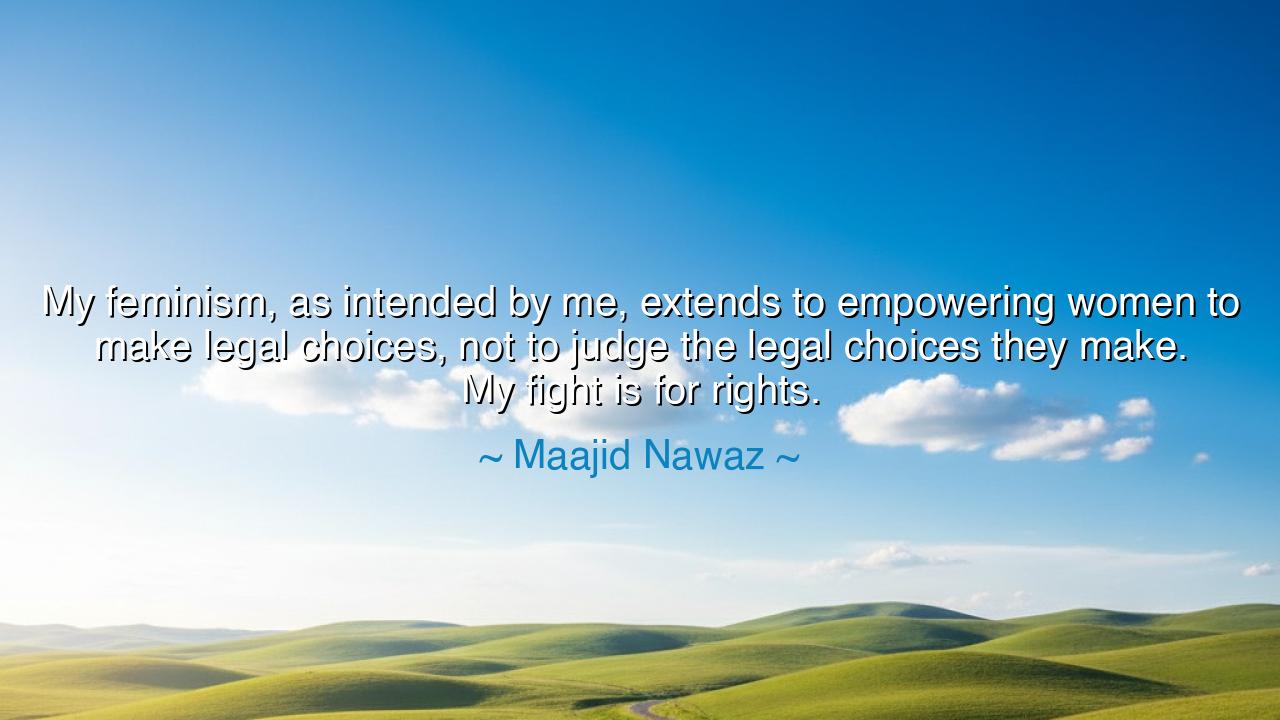
My feminism, as intended by me, extends to empowering women to
My feminism, as intended by me, extends to empowering women to make legal choices, not to judge the legal choices they make. My fight is for rights.






In the annals of human justice and moral philosophy, the struggle for equality has always been intertwined with the preservation of choice. Maajid Nawaz’s words, “My feminism, as intended by me, extends to empowering women to make legal choices, not to judge the legal choices they make. My fight is for rights,” illuminate a profound truth: true empowerment is the defense of autonomy, not the imposition of ideology. Here lies a meditation on liberty, responsibility, and the enduring principle that rights exist to enable action, not to dictate the content of that action.
From the courts of Athens to the halls of medieval European councils, philosophers and lawmakers have grappled with the balance between liberty and social control. Women, often denied participation in public life, were constrained in both their legal and personal choices. Nawaz’s reflection mirrors this ancient struggle: feminism, when rightly understood, is not an instrument of judgment but a shield for autonomy, ensuring that women may act freely within the bounds of law and conscience. Rights are the framework within which choice can flourish.
History provides vivid illustration. In the early 20th century, women in the United States and the United Kingdom fought not only for the right to vote, but for the legal ability to own property, enter professions, and control their own lives. Figures such as Susan B. Anthony and Emmeline Pankhurst did not seek to dictate how women should exercise these rights; rather, they championed the principle that women must be free to make choices, whether in work, marriage, or civic life, guided by their own judgment. Nawaz’s declaration echoes this philosophy: empowerment lies in the protection of legal capacity, not in moral imposition.
Consider the story of Ruth Bader Ginsburg, whose career as a lawyer and Supreme Court Justice exemplified the principle Nawaz espouses. Ginsburg fought to dismantle laws and policies that restricted women’s legal autonomy, ensuring that women could make decisions for themselves—whether in career, family, or property—without interference. Her struggle was never to dictate personal choices, but to protect the legal framework that allows women to act freely. This distinction between judgment and empowerment is central to Nawaz’s conception of feminism.
The philosophical resonance of his words is profound: rights are instruments of liberty, and empowerment is the preservation of agency. To judge choices is to undermine the very autonomy that rights are intended to protect. In every era, from the Roman Republic to modern liberal democracies, thinkers have recognized that the value of law lies not in controlling behavior, but in providing the structures that allow individuals to navigate life with freedom and security.
For contemporary society, this teaching carries practical guidance. Champion the legal rights of others without imposing your moral framework on their decisions. Support policies and institutions that preserve autonomy, defend personal choice, and respect the diversity of human judgment. Recognize that true equality is not uniformity, but the ability of each individual to act within a protected and fair legal framework.
The lesson extends beyond gender alone. Whether in matters of religion, expression, or economic opportunity, the principle remains: defend rights, empower autonomy, and resist the temptation to judge choices that are legally permissible. In doing so, society cultivates a culture of respect, agency, and moral courage, allowing individuals to flourish according to their own values within the bounds of law.
Thus, Maajid Nawaz’s words endure as a timeless meditation: feminism, at its truest, is the fight for rights, not for judgment. Let this reflection guide each generation to honor autonomy, protect legal empowerment, and recognize that the noblest cause is the liberation of choice, not the imposition of will. In safeguarding rights, we ensure that liberty is both meaningful and enduring, a beacon for all who seek justice and human dignity.






AAdministratorAdministrator
Welcome, honored guests. Please leave a comment, we will respond soon